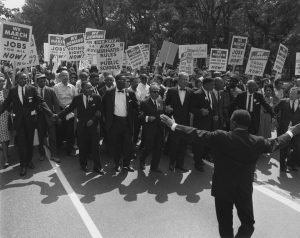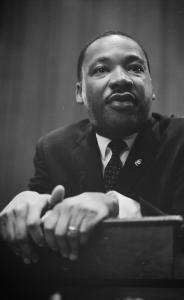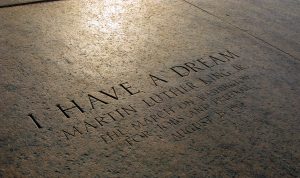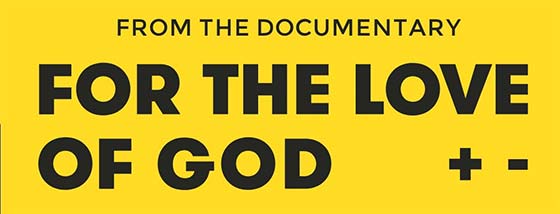Youth Resource
MLK: Power and non-violence
This segment comes from Episode 1: War + Peace.
From Jesus’ command to “love your enemies” to the idea of “holy war” is a giant leap. Yet from the Old Testament through to the Crusades and the inquisitions, Christian history is full of violence. Has Christianity been a major contributor to war? How have the followers of a crucified leader managed to get things so wrong? And what difference has it made when they have followed his example of peace-making and non-violence? This segment looks at the life of Martin Luther King Jr, an example of someone whose non-violent resistance was anchored in the teachings of Jesus.
Videos
-
MLK: Power and non-violence
Martin Luther King Jr opposed a racist, unjust system – but sought to love those within it.
Transcript
SIMON SMART: Jesus gave the world a new “tune” when it came to enemies – relinquish violence in favour of love.
Someone who truly embodied that radical teaching – to great effect – was a Baptist preacher from America’s south. He led the fight for civil rights for African Americans from 1955 until his assassination in 1968.
The Reverend Doctor Martin Luther King Jr.
On August 28, 1963, on the steps of the Lincoln Memorial in Washington DC, King delivered a piece of rhetorical brilliance that became a high point of the Civil Rights Movement. Under the gaze of one great emancipator, he would unfold his vision of another social revolution.
250,000 people gathered here for the march on Washington – a massive rally to demand civil and economic rights for African Americans. It was late in the day, and King stepped up to the microphone and delivered his unforgettable “I have a dream” speech.
MARTIN LUTHER KING JR (ARCHIVE): “One day right there in Alabama, little black boys and black girls will be able to join hands with little white boys and white girls as sisters and brothers – I have a dream today.”
SIMON SMART: Littered through the speech were allusions to Shakespeare, famous folk songs, the Declaration of Independence, and especially the Bible. Have a listen to this:
“I have a dream that one day every valley shall be exalted, every hill and mountain shall be made low” – that’s straight out of the book of Isaiah.
Or what about this, from the prophet Amos: “We will not be satisfied until justice rolls down like waters and righteousness like a mighty stream”.
King wasn’t just a great orator. His whole approach to the battle for civil rights was shaped by his faith and his understanding of the profound ethic of love at its centre.
MARIA J. STEPHAN: Martin Luther King was able to apply the Christian notion of love and connect it to the Gandhian method of nonviolent resistance in a very powerful way. The idea that you can resist a system but still love individuals and treat them with respect and honour. The idea that evil must be resisted; it should never be normalised. And the idea that mass nonviolent action can be a force for powerful change, is a set of principles and a message that I think will endure the test of time.
SIMON SMART: King began his journey into the leadership of the Civil Rights Movement here at Dexter Avenue Baptist Church in Montgomery, Alabama, where he was thrust – reluctantly at first – into the limelight as a key leader of the Montgomery bus boycott.
MARTIN LUTHER KING JR (ARCHIVE): “For several weeks now, we, the negro citizens of Montgomery, have been involved in a nonviolent protest against the injustices which we have experienced on the buses for a number of years. This is a nonviolent protest. We are depending on moral and spiritual forces using the method of passive resistance.”
ALBERT J. RABOTEAU: One night when the Montgomery bus boycott had gotten started, he received a telephone call from someone who said that he was going to be killed, his family was going to be killed, his house was going to be bombed. It was kind of the straw that broke the camel’s back. He just sat down at the kitchen table with a cup of coffee and said a prayer, which basically was, “Lord, I’m down here trying to do good, but I’m losing my courage”. And he said he heard a voice speaking to him, saying, “Martin Luther King, stand up for what’s right, stand up for justice, and I will never abandon you. I will never leave you. I’ll never leave you alone. I’ll never leave you alone.” And for King, that kitchen table experience became for him the rock-solid basis for his activism, even though he knew as his life went on and on, that he was not going to die in bed.
SIMON SMART: The boycott was ultimately a success. But in the middle of the struggle, King’s house was firebombed, with his wife and baby daughter inside.
They escaped unharmed, but the event enflamed the tempers of King’s supporters. That night an angry mob gathered at the front of the house.
Imagine being part of that crowd, surrounded by men with sticks and guns and shovels, determined to exact revenge. Ready for action and watching as Martin Luther King comes out.
He told them to go home. It’s an extraordinary reaction. And he urged them to love their white brothers no matter what, and called on them to follow the example of Jesus and to meet hate with love.
King would be arrested and imprisoned dozens of times, his life threatened, his character smeared by the FBI. But he became more and more convinced that nonviolent resistance was not only an effective political tool but a whole way of seeing the world – one that emerged from his faith.
ALBERT J. RABOTEAU: For many people in the Civil Rights Movement the non-violence was a tactic, a political tactic, which they accepted as important. But for them, they did not adapt it as a way of life, as King did. For King, non-violence was not simply a tactic; it was a way of life that reflected the Creator, in whose image and likeness all of us were made.
SIMON SMART: It’s impossible to miss the fact that the entire premise of King’s philosophy, and the hard discipline of non-violence, relied on the resources of faith found in the African American church.
It was a costly exercise – people lost their lives. But those involved were sustained by a deeply held belief that in acting this way they were playing the tune of Jesus, in harmony with the very nature of the universe.
MIROSLAV VOLF: Christian faith, at its very heart, is about grace. I think that that’s not controversial.
Grace that gives without seeking in return, and grace that gives also in situation of injury which we call forgiveness. And I think if you take grace as fundamental to Christian faith, then you see how fundamentally it works against the violence.
Generosity toward the others, forgiveness of others’ injuries, reconciliation as a kind of a modality of restoration of human beings to what they were originally created to be. All of that is central to the Christian faith. Put it to be as central in practice and you’ll have a major contribution to a peaceful world.
close
Theme Question
- Place a mark on this line for where you think Christianity falls on the scale between violence and peace. Then, share your response with the class.
Engage
- How do you feel when you have no power?
- How do you change something that is clearly wrong?
- Brainstorm all the words and images that come into your head when you think of the word “protest”.
- Is there any cause that you’d be prepared to fight for even if it cost you your life?
- What observations can you make about the following images of the Civil Rights Movement in the United States?



- Draw a picture that symbolises one or some of the injustices facing African Americans before the civil rights movement.
Understand & Evaluate
Watch the segment: MLK: Power and non-violence
- List three significant events in Martin Luther King Jr’s life.

- What would you expect a demand for civil and economic rights to look like? What did it actually look like under the leadership of Martin Luther King Jr?
- According to the documentary, how was Martin Luther King Jr’s approach to the battle for civil rights “shaped by his faith and his understanding of the profound ethic of love at its centre”?
- How could Martin Luther King Jr continue in the fight for civil rights in America even though “he knew … he was not going to die in bed”?
- Imagine you were in the crowd that assembled at Martin Luther King Jr’s house after it was firebombed. How would you have reacted when he told you and those with you to “go home”?
- Miroslav Volf says that the idea of grace is at the very heart of the Christian faith. He describes grace as showing generosity towards others without seeking anything in return, and forgiving and seeking reconciliation when you’ve been wronged. Volf says that if this idea is put into practice, “you’ll have a major contribution to a peaceful world”.
- What is your reaction to these ideas?
- How did Martin Luther King Jr “play in tune” with Jesus by embodying this idea of grace?
- How could putting this into practice bring about “a major contribution to a peaceful world”?
Bible Focus
Read Isaiah 40:4-5 and Amos 5:24.
- What would an exalted valley and a mountain that has been brought low look like?

- Draw and label the image from Amos 5:24.
- What do you think Martin Luther King Jr was trying to say when he used these verses in his famous “I have a dream” speech?
Read Romans 12:17-21.
- Does this passage indicate that we are not to care about justice (focus on v.19)?
- What does this passage teach about violence and peace?
- What is one commandment in this passage that particularly stands out to you?
- Imagine a personal situation where good could overcome evil.
Apply
- What are some examples of inequality and oppression in Australia today?
- Make a poster for one issue that you think is important.
- What would be a Christian response to this issue?
- Imagine you had the opportunity to give your own speech titled “I have a dream”. What would your speech be about?
- Do you know anyone who you think embodies the idea of “grace that gives”? How close are you to following their example?
Extend
- Listen to and read the transcript of Martin Luther King Jr’s “I have a dream” speech. Write a two-page evaluation about the ways in which his Christian faith influenced the content of the speech.





